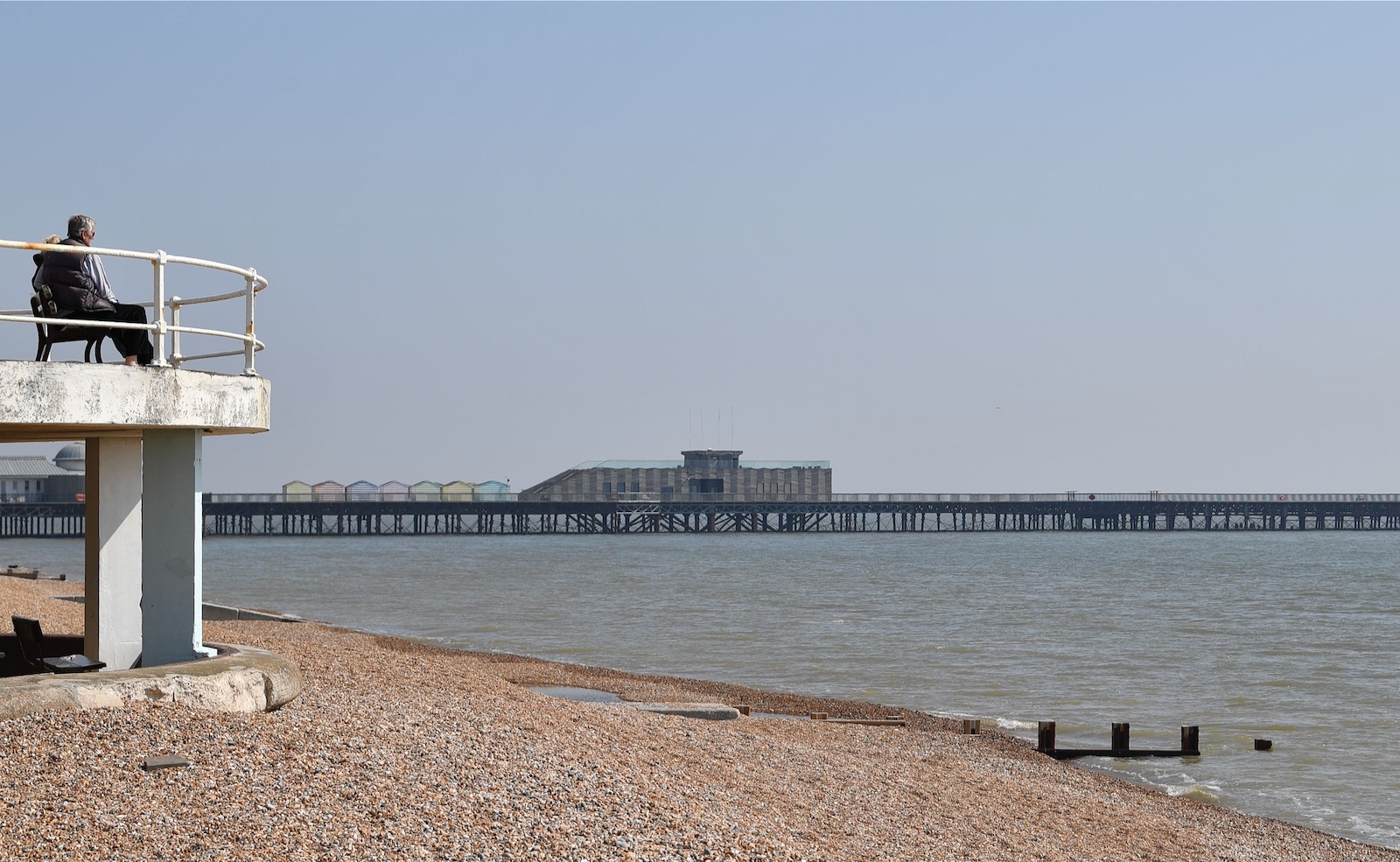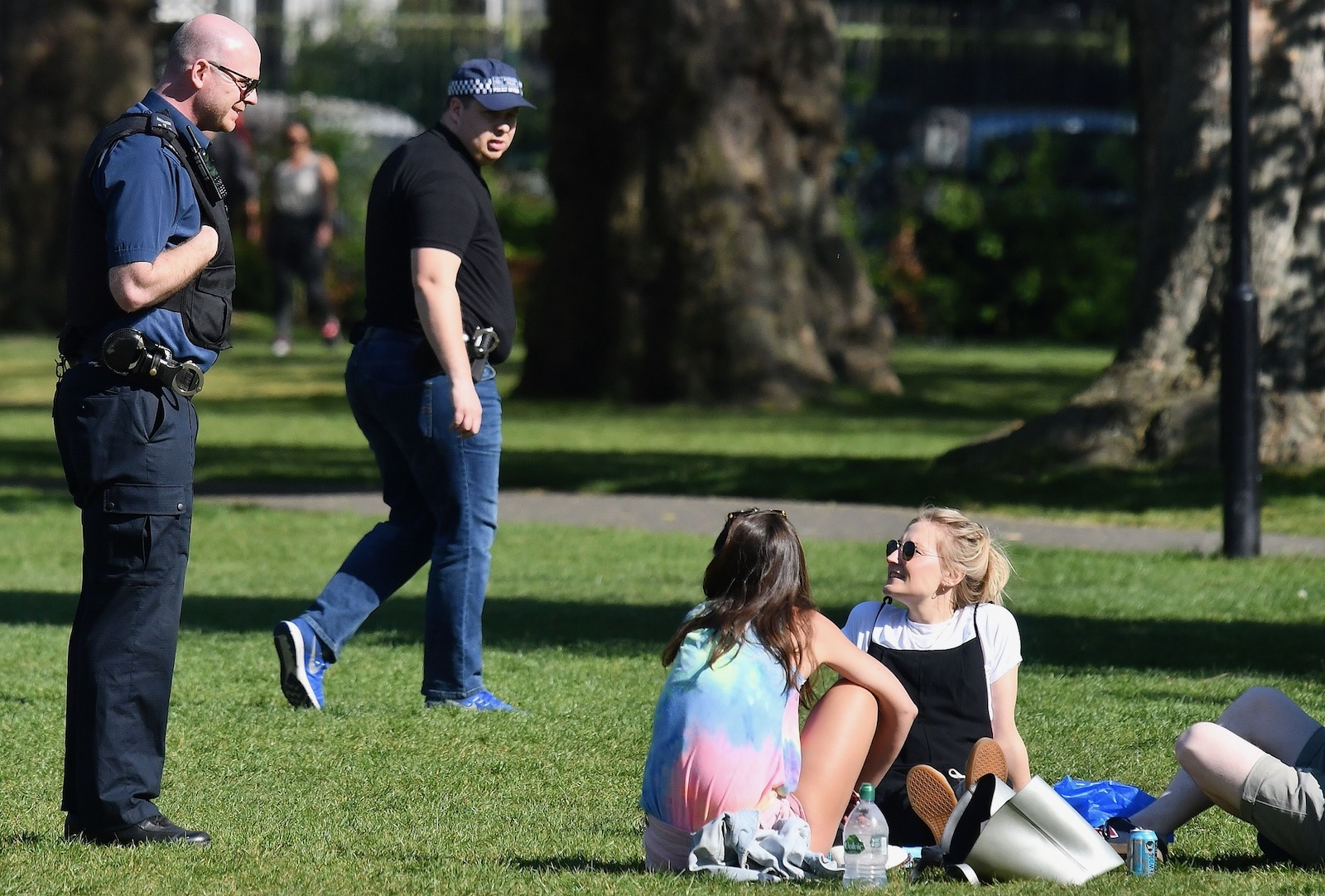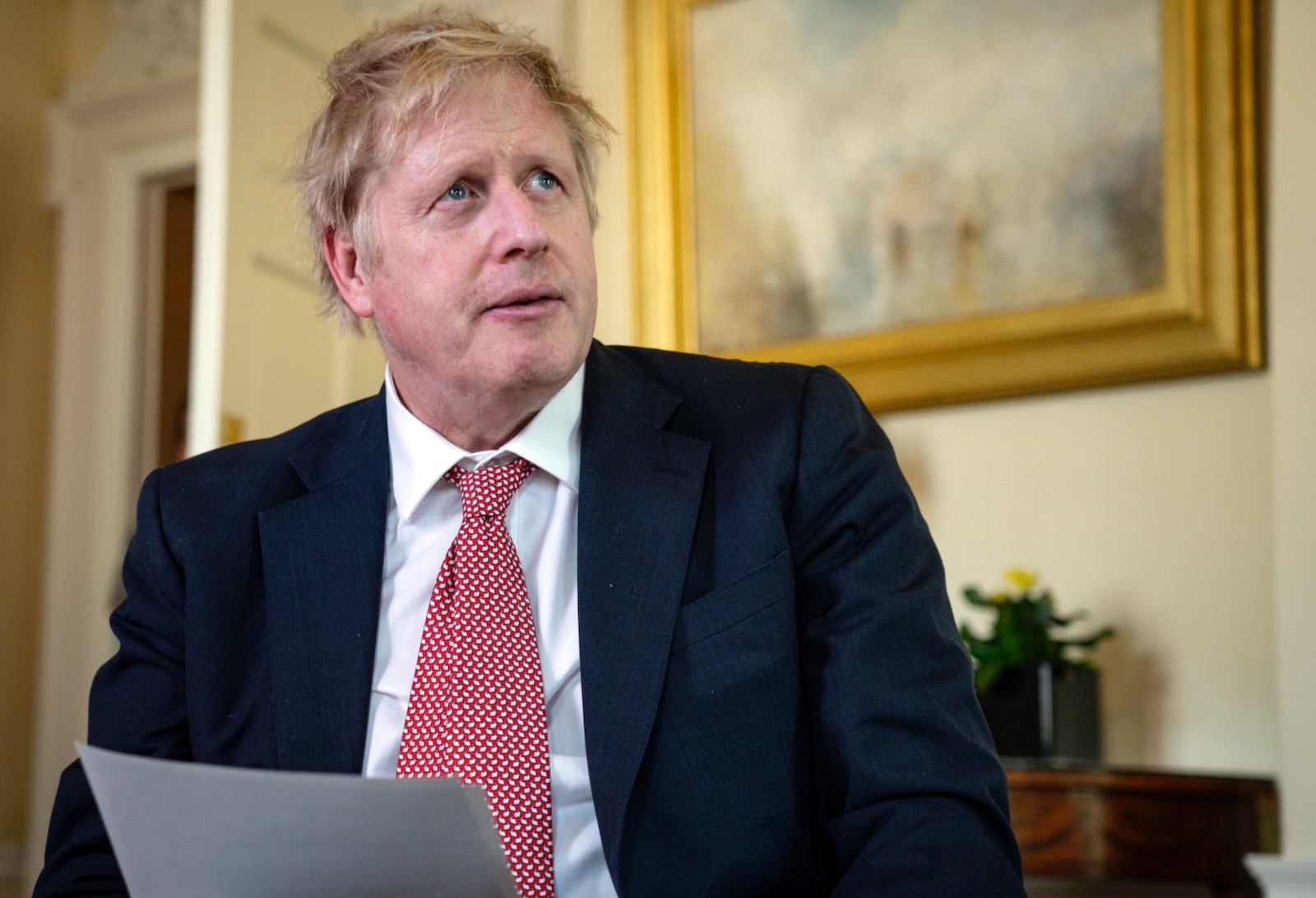HASTINGS, ENGLAND—One thing is certain: I’m not missing the buskers. My wife and I currently live here on the south coast in a house perched halfway up the town’s West Hill, with an uninterrupted view of the beachfront and the shipping lanes of the English Channel. Sounds glorious, and, in many ways, it is—but sound also travels. So, usually, when the sun coaxes the buskers onto the streets of this daytrippers’ seaside town, their limited repertoires rocket upward and our terraced garden becomes their echo chamber. Imagine an ill-tuned transistor radio playing a five-song mixtape on a loop.
Now, thanks to lockdown, that’s been silenced. Walk these deserted, sun-bleached streets and you could imagine yourself back in the early nineteenth century. No music, no fun fair rides, barely even a car; just an occasional man and dog. The only sounds these days emanate from our neighbors’ home repairs—and our own, as scaffolding goes up so that our peeling clapboard frontage will get its overdue coat of paint. As we all come to terms with this open-ended season of house arrest, there seems a strong urge to shore up defenses, to get into some heavy-duty housekeeping—as the crashing websites of hardware stores attest. By the end of this pandemic, Britain will be a very well-kempt nation. Impoverished but tidy.
Britain loves its DIY and the same goes for our Covid-19 response. This nation of amateur painters and carpenters seems to gain a sense of security and confidence, even dignity, by making a bodged first effort that goes hopelessly wrong and then, after serious rethinking and spine-straightening, a second attempt that comes out all right in the end. And this pattern conforms to Britain’s founding modern myth: the War.
World War II still pervades British culture to an excruciating extent. It’s ever-present, from the only undisputed face on our banknotes, Winston Churchill’s, to the one thing sure to open wallets and purses for donations, “wartime service.” During the last few weeks, a ninety-nine-year-old war veteran proposed a short Zimmer frame-assisted walk around his garden for charity. Within a week, Captain Moore (Royal Armoured Corps, retired) had raised a heart-lifting yet preposterous £26 million. Plain Mister Moore wouldn’t have raised £2.60.
Lurking at the dangerous epicenter of this martial mythmaking is Dunkirk. In 1940, outgunned and outmaneuvered by the Wehrmacht, the British Expeditionary Force in Northern France was about to be wiped out. The Royal Navy called on “the little ships,” civilian craft from all over England’s south coast, to enable beach evacuations to the battleships offshore. Those flotillas sailed from dozens of small ports like Hastings.
Yes, Dunkirk was a horribly heavy defeat. Yes, it was undeniably the fault of our generals and politicians. And yes, while the rescue-retreat saved a very significant number of men, the debacle also left many dead or imprisoned in POW camps for years. But it was this collective yet highly individualist rally-to-the-flag by English boat owners that became The Story. An appalling and thoroughly avoidable defeat was subsumed by the tales of derring-do from untrained yachtsmen and fishermen. My daily dog walk takes me past one such boat on proud display here on the corner of All Saints Street.
The Story chimed nicely, of course, with Britons’ national self-image. No one had lined us up in serried, uniform ranks, no one had demanded an oath or a membership—or anything more than the spirit of DIY. This ideal was most memorably made flesh by Charters and Caldicott, the comedic double-act originally created for Hitchcock’s The Lady Vanishes. They went on to front their own movies and radio serials throughout the war, precisely because they embodied the kind of Brit who puts himself in the firing line against fascists, all while discussing the cricket. They would not hesitate to lay down their lives to do the right thing but, for God’s sake, please don’t ever ask them to talk about it. This mentality may lie somewhere between bloody-mindedness and eccentricity, but is at its core a very British, doggedly wordless individualism.
It is a common misconception that Britain is a place of bowler-hatted conformity; almost the reverse is true. Our willingness to come together in common cause is underpinned by an obstinate nonconformist streak. In fact, it is the very gravitational pull of British institutions—the Queen, the Houses of Parliament, the BBC, et al.—that gives us the confidence to take these contrarian positions. Their solidity, their history makes it safe for us to sporadically challenge lesser-seeming orthodoxies. But this fitful rejection of status quo that has punctuated British history has now been allowed to become the norm and, most worrying of all, is being encouraged by certain politicians. In the pursuit of unscrupulous power, they have summoned the politics of anger—first, harmfully enough, over Brexit; now, far more immediately dangerous, over the Covid-19 response.
Advertisement
*
Britain today is no longer a country divided by left vs. right or new vs. trad. Instead, this is a nation split between the Won’t-Be-Tolds and the Will-Be-Tolds. The latter know that the only way out of a mess (any mess) is shared, multinational decision-making and cooperation. For the former, rejecting reality has become a thrilling end in itself: the new opium of these people is to deny unanimous evidence and well-researched advice. “No one’s going to tell us what to do” has become the whole of their sermon. And the idea of any kind of supra-national governance is treated as tantamount to enemy occupation.
Famously, Michael Gove, one of Brexit’s foremost Leavers, when confronted with an obstinate fact by an interviewer during the 2016 referendum campaign, declared: “People in this country have had enough of experts.” Half the country experienced a lurch of nausea, the other half let out a whoop. But this fierce paleo-rejectionism was exactly what Leave voters wanted to hear. They knew the post-Brexit promises were lies and it didn’t matter. What does matter now to half the country is the chance Never To Be Told, either by experts or anyone else, let alone Johnny Foreigner.
This may look akin to American-style libertarianism—the sort of self-assertion that refuses face masks or seeks to “liberate” Minnesota or Michigan—but this British strain is more snobbish, less anti-government, and, arguably, more anti-intellectual for the sake of being anti-intellectual. There is no British belief in a conspiracy hatched by a shrouded cabal in the national capital—even the federalist inclinations of the EU were seen as incompetent and meddlesome rather than sinister and power-grabbing. This anti-intellectualism has never, until now, been part of British politics, but it has played perfectly for Boris Johnson: his shtick has always been to offset his showoffy Sixth-Form Latin by behaving like a high-school dropout in search of a comb.
As a result, he effortlessly scooped up all these new Won’t-Be-Told votes in last December’s election. And he knows his government must continue to placate this constituency: the 52 percent who voted to leave Europe not because they really believed it would make them richer, stronger, wiser, or whiter, but because they just wanted their DIY. They wanted the chance to bodge things their way. An Englishman’s home is his poorly maintained castle.
But what now, after politicians worldwide—even, on some days, the American president—have accepted the inevitability of a science-led response to Covid-19? The answer is that Britain’s leaders have still found scope to Not Be Told: back in March, our government rejected the chance to purchase ventilators through a European bulk-buy program. For the Won’t-Be-Tolds of Downing Street, this decision was a no-brainer (this was before the prime minister came within an ace of needing ventilation himself). The inevitable result was that Little Britain was outbid in the world markets and sent to the back of the line: “Brexit before breathing,” as pundits have termed it.
In the early stages of this scandal, government officials claimed that the EU’s email invitation had been “mislaid” (maybe the Johnsons’ new dog ate it). Then, a week ago, a senior civil servant told a parliamentary committee that “it was a political decision” to decline the EU offer. The next day, that same official was forced to write a clenched-teeth retraction of this explanation. And now that the UK has been forced to ration personal protective equipment in hospitals, it’s back to Brussels we must go—like Oliver Twist pleading for a second bowlful.
When it comes to actually doing something to tackle the crisis, even as the death toll continues to rise, the last few weeks have seen a remarkable sequence of announced plans—and then near-continuous failure to launch them. It is not irrelevant that the crisis was looming just as the official Exit Day (January 31) was being celebrated by Leavers. Shamefully calling it their Independence Day, the last thing these Won’t-Be-Tolds wanted right then was To Be Told.
So it is unsurprising that, in the early stages, our Tiggerish prime minister jumped at the suggested strategy of allowing “herd immunity” to develop—the course of action that would require the least government intervention, and one that, in fact, enabled him to retreat to his country hideaway for twelve days of self-congratulation, instead of being present to chair five crucial Covid-response planning meetings.
Advertisement
The herd immunity approach was quickly shelved—indeed, the government now denies it was ever official policy. But, in the interim, major sporting events like the Cheltenham Racing Festival and a Liverpool F.C. game against Atletico Madrid went ahead. Those lost weeks are certainly what may make the UK, fast overhauling Spain and Italy, into the nation worst-hit by Covid-19 in Europe.
Seeking to regain some ground, the health secretary promised tests for all essential workers (not just health workers), but on its first day the website offering appointments was over-subscribed in under two minutes. “It looks like the demand is there,” trumpeted the minister, as though this humiliation constituted a species of success. Meanwhile, the home-testing kits ran out in the first hour; Her Majesty’s Government, we learn, managed to spend $20 million on antibody tests that don’t work; and while we do now have mass testing, there is no one to trace and track people’s contacts.
It is not just this Won’t-Be-Told refusal to take expert advice or participate in international cooperation, for we now face the starkly sad fact that the Brexit infighting resulted in a culling from the front ranks of the Tory Party of nearly all those with cabinet-level experience. Almost by definition, anyone of any real ability could not support Johnson’s hard-line, promise-stomping approach to the European divorce settlement. Britain is now being managed by the B Team of bodgers. As a re-enactment of the pre-Dunkirk strategy, it makes painful viewing.
*
In Hastings, even the seagulls are feeling the crisis—the discarded fish-and-chips that form their usual subsistence is gone. Yesterday, walking along the front, I watched a gull forced by hunger to swoop down on a teenager as he strolled along, phone in one hand, burger in the other. I wanted to say something but panicked. The lad noticed just in time and the beak missed its target. If it had happened to me, I would have needed a sit-down, but the teenager pushed an insouciant hand through his hair, returned to texting, and took another bite. Truly, a Caldicott de nos jours.
Amateur sang-froid is all very well for individuals, but we do look for better from those we have vested with power. Daily, this same Michael Gove who told us we were right to be sick of experts, now tells us that government policy is “led by the science.” But it seems little more than a shield for his government’s political meandering—and we also know that Johnson’s chief of staff, Dominic Cummings, has been attending the closed-door meetings of the government’s panel of scientific advisers. This one-time Svengali of the Leave cause is notorious for his contempt of experts and civil servants (except in matters of electioneering), so it is hard to imagine them speaking truth to power with that particular eminence in the room.
Opinion polling shows that trust in the government is plummeting, and this suggests that those of us scarred by Brexit’s pig-headedness can now nurse a slim hope: it’s just possible that the Covid-19 crisis will jolt the British back toward the validity of communal, consensus decision-making that did actually save the country in the 1940s. And with it, the realization that you can’t always Do It Yourself.






